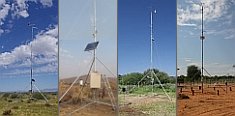Subproject W07
Prof. Dr. K. Eduard Linsenmair, Universität Würzburg, Lehrstuhl
für Tierökologie und Tropenbiologie, Zoologie III, Am Hubland, 97074
Würzburg
Fish communities in the ephemeral savanna waters of the Comoé Nationalpark,
Ivory Coast, West Africa
Introduction
Tropical freshwaters are currently subject to massive changes. In many places
water quality deteriorates due to increasing amounts of erosion borne sediments
and sewage. Draining as well as dam building change the hydrology radically,
leading to the elimination of broad spectra of habitats. Climate change influences
the amount and temporal pattern of rainfall causing profound alterations in
the basic hydrological conditions of certain regions. These abiotic changes
might lead to shifts in species abundance if not to their extinction. Consequently,
functional relationships in the species-rich tropical fish communities are expected
to change.
Objectives
In our project we investigate fish communities that use, for part of their lives,
ephemeral savanna waters temporarily connected to the Comoé river. Up
to date already 66 fish species have been caught in these ephemeral waters,
among them some new to the hitherto known fish community of the Comoé.
We are interested in the benefits (possibly better feeding or spawning conditions
and possibly also a reduced predation pressure on certain developmental stages)
and on the costs (e.g. high risk of too early a drying up) associated with the
use of these types of transient waters to understand what these species gain
by leaving the permanent water bodies. It has to be expected -and is already
evident- that different species differ considerably in their temporal, spatial,
behavioural etc. modes of using the ephemeral waters. We are furthermore especially
interested in those factors steering the temporal use patterns, e.g. those releasing
migrations out of the main river during the first half of the rainy season and
back to it towards the end and finally we want to understand the overall importance
of the temporal waters for the species composition and productivity of the entire
fish community.
During the first three years of BIOTA we want to learn as much as possible about
the mode of use by the different species, examine the community structure of
different ephemeral water bodies and the annual variability in dependence upon
climatic differences (e.g. temporal patterns of rainfall and amounts of rain
are highly variable between years). During the main phase of BIOTA antropogenically
altered habitats shall be included, the effects of disturbances influencing
the fish community investigated and their socio-economic consequences illuminated
and quantified. Due to direct as well as indirect anthropogenic changes, ephemeral
waters are reduced in numbers and quality. So far, the resulting impact of these
changes on the fish communities and the productivity of river systems is mostly
unknown. Based on a better knowledge of the fish communities and the factors
influencing them it will be possible to design scientifically based management
plans for these water bodies. By this means, we hope to be able to contribute
to the protection of Africa´s ecologically and socio-economically highly
important freshwater habitats by providing sound guidance to the preservation
of their biodiversity and to the maintenance of their productivity.
Cooperation within BIOTA:
| • |
Dr. Gerald Braun (W01) DLR: GIS and remote sensing |
| • |
Dr. Jörg Szarzynski (W02) Universität Mannheim:
Climate in CNP |
| • |
Prof. Stefan Porembski (W04) Universität Rostock:
Botanic aspects of the waters |
| • |
Dr. Mark Oliver Rödel, W08, Universität Mainz:
Amphibien communities in the ephemeral waters |
The research team:
Prof. K. E. Linsenmair, Projektleiter, Zoologie III, Am Hubland,
97074 Würzburg
Dipl. Biol. Timo Moritz, Doktorand, Zoologie III, Am Hubland, 97074 Würzburg
Exam. Biol. Minnattallah Boutros, Zoologie III, Am Hubland, 97074 Würzburg
External partners of cooperation:
Dr. G. G. Teugels, Labo Ichtyologie, Musée Royal de l`Afrique
Central, Tervuren, Belgien
CRE, Centre de Recherche en Ecologie, Université d'Abobo-Adjamé,
Côte d' Ivoire
|






 Go to the WeatherNet
Go to the WeatherNet